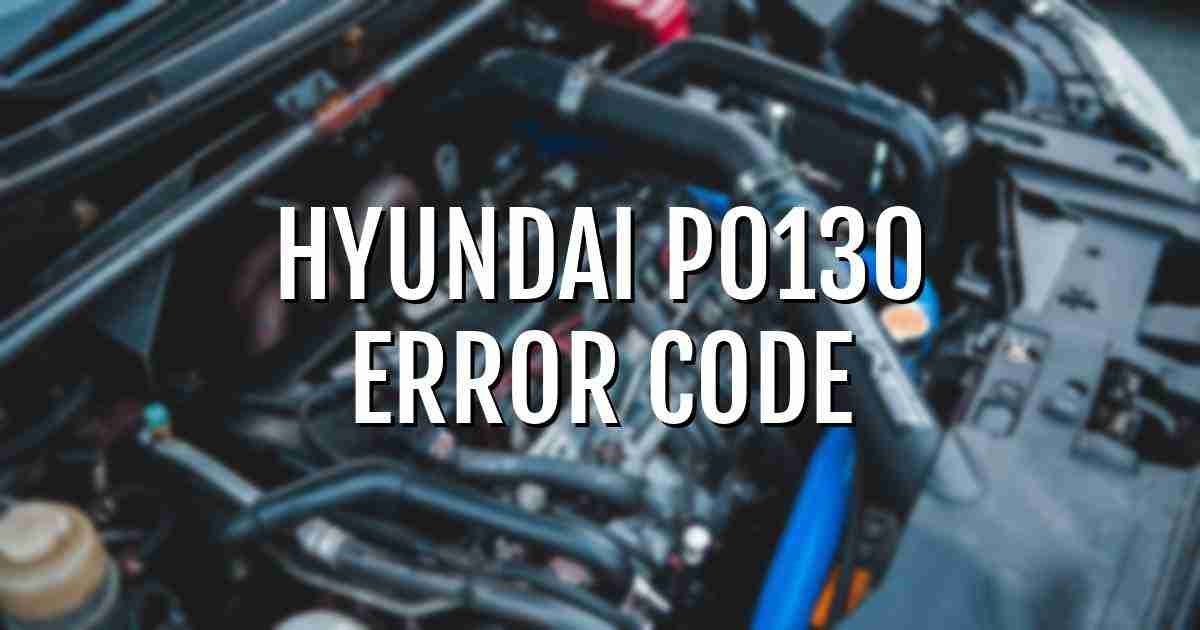The OBD code P0130 for Hyundai indicates an issue with the Front Heated Oxygen Sensor Bank 1. Symptoms include the Engine Light ON, high fuel consumption, and excessive exhaust smoke.
Causes may include a faulty sensor, wiring harness issues, or fuel system problems.
This code should be addressed promptly to prevent further damage.
A possible fix involves inspecting and repairing the sensor and related wiring connections.
| Repair Importance Level | 6.67 (Out of 10) |
| Estimated Repair Time | Approximately 1.0 hour |
| Repair Difficulty Level | 6.67 (Out of 10) |
Symptoms of the Hyundai p0130 OBD Code
The vehicle may experience issues related to the oxygen sensor circuit malfunction (P0130).
- With Hyundai OBD code P0130, the Engine Light will be ON.
- High Fuel Consumption can be noticed.
- Excessive Smoke from Exhaust may be present.
Causes of the Hyundai p0130 OBD Code
Possible reasons for Hyundai fault code P0130 include issues with the oxygen sensor or its wiring.
Do you know you can clear most fault codes—but some could mean serious danger? Don’t take chances with your safety or your family’s safety. This budget-friendly car scanner makes it easy to clear fault codes in seconds while showing you exactly what’s wrong. Plug it in, connect to your Android or iOS phone, and instantly check live data. You’ll know if it’s a minor issue you can clear or something serious that needs attention—so you can drive safely and stress-free. (Today’s Deal)
- P0130 can be caused by a Faulty Front Heated Oxygen Sensor Bank 1.
- A Front Heated Oxygen Sensor Bank 1 harness that is open or shorted.
- A Front Heated Oxygen Sensor Bank 1 circuit with poor electrical connection.
- Inappropriate fuel pressure.
- Faulty fuel injectors.
- Intake air leaks that may be faulty.
- Exhaust gas leaks.
Fixing Hyundai Error Code p0130 Step By Step
Replace faulty oxygen sensor in bank 1 sensor 1 for Hyundai fault code P0130.
- To fix Hyundai OBDII code P0130, review the ‘Possible Causes’ mentioned above and visually examine the corresponding wiring harness and connectors.
- Ensure to check for any damaged components and inspect the connector pins for signs of being broken, bent, pushed out, or corroded.
- Test the oxygen sensor (Bank 1 Sensor 1) using a scan tool to verify its operation.
- Replace the oxygen sensor if it is faulty.
- Clear the fault codes using the scan tool and test drive the vehicle to ensure the code does not return.
Cost Of Fixing Hyundai p0130 Fault Code
Diagnosing and repairing Hyundai P0130 involves testing and potentially replacing the oxygen sensor.
The cost to diagnose and fix a Hyundai OBD code P0130 typically ranges from $75 to $150, based on an estimated repair time of 1. 0 hour.
Factors like shop rates and complexity of the issue can affect the final cost.
That fault code is a turning point. If repair costs are climbing and your current loan feels like it’s holding you back, this is the time to plan ahead. The free Car Loan Payment Tracker helps you see how quickly you can pay off what’s left—and start preparing, with confidence, for your dream car.
Details of the Hyundai p0130 OBD Code
Hyundai fault code P0130 indicates an oxygen sensor circuit malfunction in bank 1 sensor 1.
OBD code P0130 for Hyundai vehicles indicates an issue with the oxygen sensor circuit bank 1 sensor 1. This code is triggered when the Engine Control Module (ECM) detects that the oxygen sensor has remained at a low voltage for too long.
The oxygen sensor is part of the emissions control system and is responsible for monitoring the oxygen content in the exhaust gases.
In this case, bank 1 refers to the side of the engine that contains cylinder 1, and sensor 1 is the precatalytic converter oxygen sensor.
The ECM uses the signal from this sensor to adjust the airfuel mixture for optimal combustion.
Mechanic’s Tech Notes
Detailed information on diagnosing and repairing Hyundai fault code P0130 related to the oxygen sensor circuit malfunction.
To diagnose and fix OBDII code P0130 in a Hyundai, start by using a voltmeter to test the oxygen sensor’s heater circuit for proper voltage.
Check for around 12 volts with the key on engine off.
If voltage is present, use a scan tool to monitor the oxygen sensor’s activity.
If the sensor is not responding correctly, it may need to be replaced.
Additionally, inspect the wiring harness and connectors for any damage or corrosion.
Ensure the connector pins are not broken, bent, or pushed out.
Address any issues found during the inspection to resolve the P0130 fault code.
FAQ
OBD code P0130 in a Hyundai means an issue with the Front Heated Oxygen Sensor Bank 1. Check sensor, wiring, fuel system, and intake/exhaust for faults.
Common causes of OBD code P0130 in a Hyundai include a faulty front heated oxygen sensor Bank 1, open/shorted sensor harness, poor electrical connection, or fuel system issues.
Diagnose P0130 in Hyundai: Check Front Heated Oxygen Sensor Bank 1 and related wiring for faults. Inspect connectors for damage or corrosion. Fix as needed.

Wrap Up
If your Hyundai is displaying OBD code P0130 and experiencing poor fuel economy, rough idling, or a drop in engine performance, it may be caused by a faulty oxygen sensor, damaged wiring, or a vacuum leak affecting the airfuel mixture.
To address Hyundai OBD code P0130, start by inspecting the oxygen sensor and its wiring harness for any signs of damage or corrosion.
Test the sensor’s functionality and replace it if necessary.
Check for any vacuum leaks in the intake system that could be affecting the sensor’s readings.

